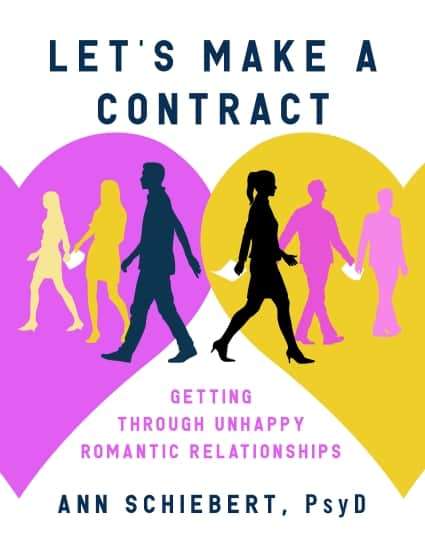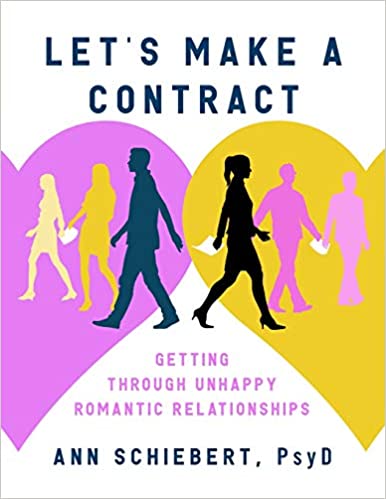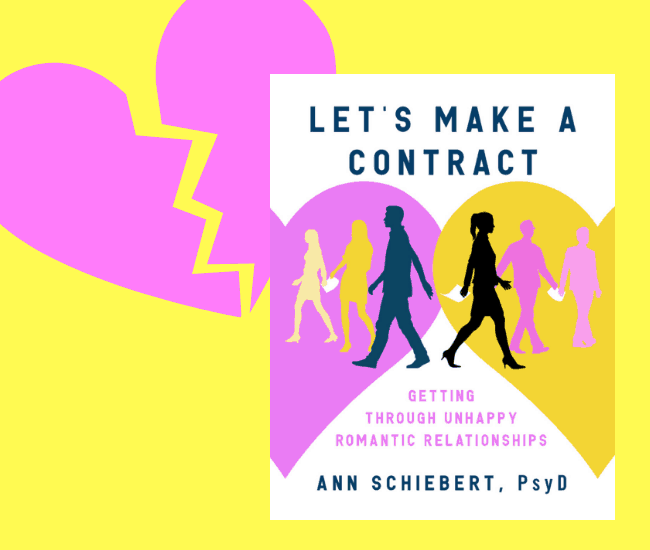Let’s Make a Contract by Dr. Ann Schiebert
What's It About?
People often don’t recognize whether they are showing patterns of an unhappy romantic relationship, to say nothing of whether they are capable of pulling themselves out of one.Dr. Ann Schiebert is a clinical psychologist whose book, Let’s Make a Contract: Getting Through Unhappy Romantic Relationships (Andrew Benzie Books), helps people discover why they are unhappy, gain a better understanding of why they stay in an unhealthy relationship, and how to increase their chances of finding a fulfilling romance.

In this exclusive BookTrib article Dr. Schiebert explains why relationships go bad and what to do about it.
Want more BookTrib? Sign up NOW for news and giveaways!
Here are the top six reasons relationships go bad:
- We have rushed into romance and don’t really know the person we are with.
- We don’t have similar values.
- We give a pass to unacceptable behavior.
- We realize we are with a narcissist.
- The inability to problem-solve.
- Behavioral or chemical dependency issues.
It is human nature to have chemistry with a potential romantic relationship. We call the chemistry a “love cocktail.” It’s a mixture of hormones and neurotransmitters that lead us to want to bond and recreate.
However, the love cocktail is never a good foundation for a long-lasting romantic relationship because it is superficial. Its power helps us put on rose-colored glasses so that we ignore or rationalize types of behavior that irritate us. The love cocktail lasts about six months, and then we begin to see our partner’s “faults.”
Having a conversation about values is an occurrence that rarely happens. Like values form a strong foundation for happy romantic relationships. It is a challenge to engage in this type of conversation when the love cocktail is in charge because the love cocktail has the ability to make us metaphorically blind and deaf – we can’t hear or see what’s true.
When we give a pass to behaviors that are insulting, mean, or violate our values, we train the person we are with that unacceptable behavior is actually “acceptable with a grudge.” We avoid conflict by giving the pass and we then hold a grudge or develop resentments. We often “get even” through passive-aggressive “paybacks” such as withdrawing, denying we are upset when we are, or expressing our anger about another topic. By giving a pass, we are not being honest with our partner. We are in essence saying, “I may not like it when you do this, but it’s somehow OK to do it.”
Narcissists can be exciting and engaging. They are usually accomplished and charismatic. Be aware. Get out your Sherlock Holmes magnifying glass to search for indications of narcissism. When we get into relationships with narcissists, there is no YOU. There is only the narcissist, and somehow life starts to revolve around his or her wants and desires.
If we are incapable of solving problems, we will find misery in our romantic relationship. If we can’t solve problems, there will be a winner and a loser in each argument. It’s a temporary win for the winner and a nest for resentments that are accumulated and remembered by the loser. When piled together, these resentments and grudges can lead to hate and despair.
With behavioral addictions such as gambling, excessive spending, and chemical addictions such as alcoholism, it’s very difficult to create a happy and loving relationship until the one with the addiction enters recovery. Without a partner in recovery, you will be second in the relationship because the addiction comes first.
This is how we end up in unhappy romantic relationships.
What to Do About It
It is difficult to repair an unhappy romantic relationship if we have not done the up-front work. Since most of us haven’t because we don’t think about such things, we have to start at the beginning with someone we are already in an unhappy romantic relationship with.
First, enumerate the ways you have tried to save or change for the better your unhappy romantic relationship. Did you nag? Beg? Yell? Read books on the subject? Did it help? If you had some successes in creating change keep doing more of that. If you have had few or no successes in trying to reignite your relationship, ask yourself, “Am I all alone in this?”
Second, write down how you are feeling about the relationship. Happy? Hateful? Tired? Joyous? Pessimistic?
Third, create an “Irritation Worksheet” on which you score from 0 – 10. If you have a partner who would participate in such an inventory ask him/her to do the same thing. The Irritation Worksheet can provide a format for conversation and problem solving.
Fourth, agreeing on Fair Fighting Rules is critical. For example, discuss the issue and not the person. Do not yell or call names.
Lastly, request five minutes to discuss one topic that is troubling you. Begin with the most simplistic challenge and, over time, work toward discussing your more emotionally painful issues. Write down the issue in one sentence. State it clearly. Tell your partner why this is a problem for you. Use “I” statements. For example: I’d like to talk to you for five minutes about watering the garden. Is this a good time? (Supposing the response is “yes.”) I thought you wanted to do this. The flowers are dying. I’m perplexed. I would be so happy if you would tell me the watering schedule. Period. Don’t say another thing. Wait for your partner’s response. Don’t argue the answer. Say, “Thank you for telling me your position.” Period. Go do something else.
If you have a partner who will join you in repairing relationship irritations, grudges, and resentments, you have a chance of recreating your romantic relationship into a happier one. If you do not, it’s time to consider exactly why you are staying.
Let’s Make a Contract: Getting Through Unhappy Romantic Relationships is now available for purchase.





